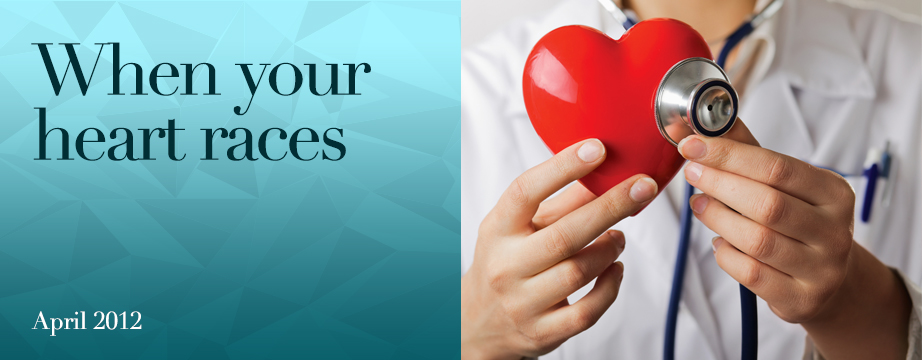
| “A lurCh In my hEArT”, “A ThumpInG fEEling In my chestâ€, “Feels like I have just been running, except that I haven’t!â€, “A fluttering feeling in my chestâ€, “Like bubbling in my chestâ€. Have you ever felt any of these? These are actual descriptions of what “palpitations†feel like, from the mouths of patients themselves. |
| Palpitations is simply “an awareness of the heart beating†Ordinarily, the heart beats without us ever being aware that it is. |
| Palpitations may occasionally be accompanied by other symptoms, like an urge to cough, or difficulty in breathing or giddiness, even chest pain and blackouts or sudden collapse. |
| Whether palpitations are serious or not depends on the point of origin (i.e which part of the heart they originate) and whether the structure and function of the heart is normal. The heart is made of two upper and 2 lower chambers. In general, palpitations that originate from the upper chambers (atria) are more benign whereas those that originate from the lower chambers (ventricles) tend to be life threatening. If the heart is structurally abnormal (has disease) and the heart function is weak (low ejection fraction), then any palpitations (from upper or lower chamber) can cause low blood pressure, blackout or collapse. |
| My job is to tease out which palpitations are serious and which are not and treat appropriately. A stepwise approach is: |
|
| Radiofrequency catheter ablation (RFCA) offers patients with arrhythmia the chance of a cure without the need to take medication for life. RFCA can be performed for a variety of arrhythmias (atrial or ventricular). Success rates, complications and recurrence rates vary for each type of arrhythmia being ablated and should be discussed with the electrophysiologist. |
| However not all palpitations need ablation. Some types are caused by beats that occur slightly ahead of the next scheduled beat. These are termed ectopic beats. They are annoying to the patient but do not pose a threat to the patient if there is no underlying heart disease. In those cases, only reassurance is needed. Finally anxiety and stress can cause palpitations, although the heart rate and rhythm are normal. After all “palpitations†is merely the “awareness†of one’s heart beat and does not necessarily mean that there is something wrong with the heart rate or rhythm. In such cases, addressing the cause of anxiety or stress is all that is needed. |
 DR RUTH KAM
DR RUTH KAMCardiologist
MBBS (Singapore)
MRCP (Int Med) (UK)
M Med (Int Med) (Singapore),
FAMS (Cardiology), FRCP (Edin)
Ruth Kam Heart and Arrhythmia Clinic
1 Farrer Park Station Road, #07-11 Connexion
Farrer Park Medical Centre, Singapore 217562
Tel: 6443 0468
www.arrhythmia.com.sg
1 Farrer Park Station Road, #07-11 Connexion
Farrer Park Medical Centre, Singapore 217562
Tel: 6443 0468
www.arrhythmia.com.sg



